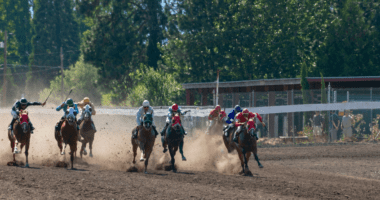New Oregon Justice Department Opinion On Flying Lark Gambling Plans Complicates Situation Further

For the developers of the Flying Lark near Grants Pass in Oregon, it must feel like the obstacles are only growing larger with time. Due to a new Oregon Justice Department opinion, it’s now more precarious for those who might support developers’ plans to act in their favor.
The OR Justice Dept. has found plans to offer historical horse racing (HHR) machines at the facility in violation of the state’s constitution. Although that’s just the newest obstacle, it could prove the most serious.
Oregon Justice Department opinion complicates future
On the heels of the introduction of bills in the OR legislature that could restrict HHR gaming, this decision from the OR Justice Dept. has to hit like a ton of bricks for the horse racing interests in the state. The Flying Lark is a planned venture of Dutch Bros. Coffee founder Travis Boersma.
He plans to offer 225 HHR machines in an entertainment center
next door to Grants Pass Downs. Boersma says he has already spent $50 million on construction and refurbishment. Currently, he’s awaiting approval from the OR Racing Commission to move forward.
The Commission has been held up waiting for the Justice Dept. On Friday, that wait ended. The OR Justice Dept. said that the HHR machines Boersma wants to make available are games of chance. As such, they violate the state’s constitution.
The OR Constitution gives sovereign people groups within the state’s borders the exclusive rights to offer such games. In order to offer gaming on a commercial basis, operators need to prove to regulators that games are those of skill and not of chance.
While the Justice Dept. opinion carries weight, it’s ultimately the Racing Commission’s decision. The opinion creates a minefield for the Commission if it proceeds to approve Boersma’s plans.
Could the Justice Department press an issue on Racing Commission?
Opinions of this kind fall short of directions to interests and regulators in the state. However, they do signal potential litigation with the state acting as the plaintiff if private parties or regulators act in a way that’s contrary to the opinion.
Thus, if the Racing Commission approves Boersma’s plans, the Justice Dept. could sue to block the awarding or implementation of the license. That possibility might act as a deterrent for Commission members.
The pending status of bills that could change the parameters around HHR machines in the state is another factor. One of the bills would at least delay the state’s ability to offer any kind of new gambling.
Another entity with some power that opposes the Flying Lark plans is behind those bills and stands to benefit from the derailment of those plans. Naturally, they were happy to read the Justice Dept.’s opinion.
Tribal casino operators laud HHR opinion
Cow Creek Band of Umpqua Tribe of Indians attorney Anthony Broadman articulated the position of the operators of the existing tribal casinos in OR.
“What we saw today was the DOJ finally agreeing with what the tribes have been saying for 10 years,” Broadman stated. “We’ve seen the rapid proliferation of state-sanctioned gambling without a corresponding increase in the state’s capacity to oversee it.”
Whether Boersma could find alternatives that satisfy the games of skill threshold is questionable. The type of HHR machines that he desired to offer at the Flying Lark has become increasingly popular.
That’s due to their strong resemblance to slot machines you’d find at OR tribal casinos. The appearance and user experience can sometimes be essentially identical. That’s part of why tribal casinos object to their proliferation.
It’s unlikely that tribal casinos will ever see the Flying Lark as anything but competition. Now, the OR Justice Dept. seems on their side. That spells trouble for Boersma and horse racing advocates in the state.










